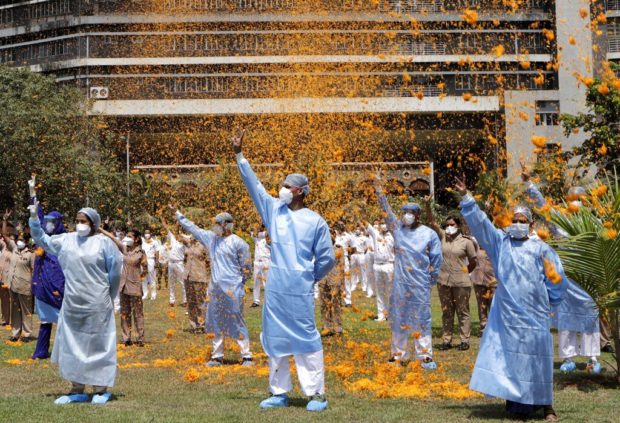WELLINGTON, New Zealand — There were signs Monday that the coronavirus pandemic was easing significantly in some parts of Europe but getting worse in India and Russia.

An Indian Air Force helicopter showers flower petals on the staff of INS Asvini hospital in Mumbai, India, Sunday, May 3, 2020. The event was part the Armed Forces’ efforts to thank the workers, including doctors, nurses and police personnel, who have been at the forefront of the country’s battle against the COVID-19 pandemic. (AP Photo/Rajanish Kakade)
Meanwhile, pressure to reopen kept building in the U.S. — which has only seen a slight drop in reported daily new cases — as tens of millions have lost their jobs in the worst economic downturn since the Great Depression.
While people around the world started taking advantage of an easing in lockdowns to enjoy the outdoors, health experts warned of a potential second wave of infections unless testing is expanded dramatically.
As Italy prepared to reopen parks and public gardens from Monday, health officials reported 174 deaths, the lowest number since a national lockdown began on March 10.
Like Italy, Spain has seen a significant downward trend in reported new cases. And Belgium was also relaxing some of its lockdown measures from Monday, confident enough that the outbreak there was on the wane.
But in India, new infections have been rising rapidly. The lockdown of the country’s 1.3 billion people was extended two more weeks, but with some measures relaxed, as reported cases reached 42,000 with nearly 1,400 deaths. In New Delhi, a designated hot spot where many restrictions remained, construction workers, Uber drivers and self-employed people such as housekeepers returned to work.
India air force helicopters showered flower petals on hospitals in several cities to thank doctors, nurses and police at the forefront of the battle against the pandemic.
And in Russia, new reported cases exceeded 10,000 for the first time, bringing total cases to about 135,000 with nearly 1,300 deaths.
In some good news, New Zealand reported no new cases on Monday, marking a significant moment that indicated the country’s bold strategy of trying to eliminate the virus was working.
Prime Minister Jacinda Ardern said she would talk to her Australian counterpart Scott Morrison and other top Australian lawmakers on Tuesday about the idea of restarting travel between the two countries.
In Britain, Prime Minister Boris Johnson said he got so sick from the coronavirus that doctors had discussed what to say if he had died.
Johnson has been under pressure to reveal how the country will lift its lockdown. The restrictions are due to last through Thursday, but with hundreds of deaths still being reported daily, it’s unclear how the country can safely loosen the restrictions.
The U.S. continues to see tens of thousands of new infections each day. The nation’s nursing homes — faced with 20,000 coronavirus deaths and counting — were pushing back against a potential flood of lawsuits with a sweeping lobbying effort.
At a virtual town hall Sunday night, President Donald Trump acknowledged some Americans were worried about getting sick while others were concerned about losing jobs.
Though the administration’s handling of the pandemic, particularly the ability to conduct widespread testing, has come under criticism, the president defended the response and said the nation was ready to begin reopening.
“We have to get it back open safely but as quickly as possible,” Trump said.
Speaking on “Fox News Sunday,” White House coronavirus coordinator Deborah Birx expressed concern about protests by armed and mostly maskless crowds demanding an end to stay-at-home orders and a full reboot of the economy. Trump has encouraged people to “liberate” their states.
“It’s devastatingly worrisome to me personally, because if they go home and infect their grandmother or their grandfather … they will feel guilty for the rest of our lives,” she said. “So we need to protect each other at the same time we’re voicing our discontent.”
The divide in the U.S. between those who want lockdowns to end and those who want to move more cautiously extended to Congress.
The Republican-majority Senate will reopen Monday in Washington. The Democrat-controlled House of Representatives is staying shuttered. Senate Majority Leader Mitch McConnell’s decision to convene 100 senators gives Trump, a Republican, the imagery he wants of America getting back to work, despite the risks.
CBS News “60 Minutes” correspondent Lesley Stahl said that she’s finally feeling well after a battle with the virus that left her hospitalized for a week.
China, which reported just three new cases Monday, has seen a surge in visitors to tourist spots newly reopened ahead of a five-day holiday that runs through Tuesday. Nearly 1.7 million people visited Beijing parks on the first two days of the holiday, and Shanghai’s main tourist spots welcomed more than 1 million visitors, according to Chinese media. Many spots limited daily visitors to 30% of capacity.
Another potentially troubling sign emerged in Afghanistan’s capital of Kabul, where a third of 500 people tested randomly were positive.
Governments have reported 3.5 million infections and more than 247,000 deaths, including more than 67,000 dead in the United States, according to a count by Johns Hopkins University. Deliberately concealed outbreaks, low testing rates and the severe strain the disease has placed on health care systems mean the true scale of the pandemic is undoubtedly much greater.